Unf**king the Climate - Part 2: Food
Talking about food gets loud and ideological, but we're going to have a judgement free chat about livestock, flexitarianism, veganism, and my favourite: the invasivore diet. Let's fix the planet a little with our stomachs.
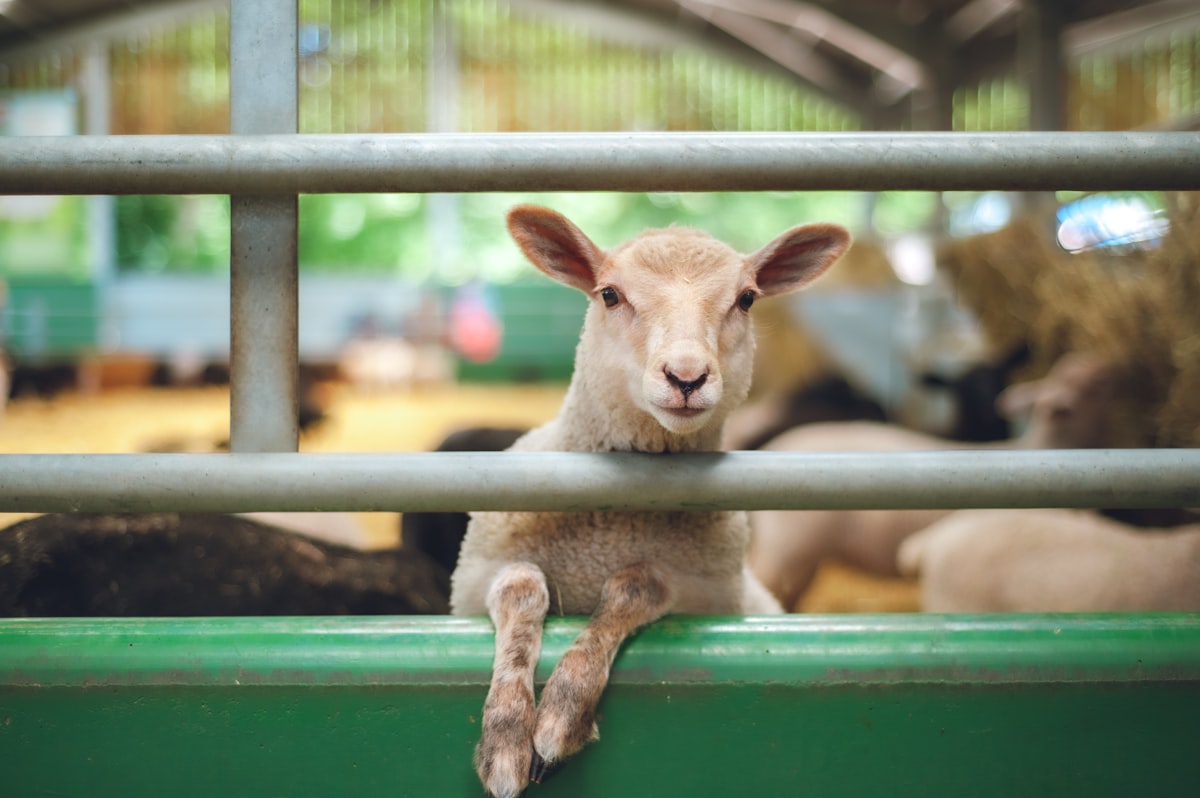
There are a lot of directions I could have gone in for the second part of Unf**king the Climate. We could have covered more baseline theory, how to think about lifecycle analysis, talked about how to identify greenwashing, or analysed average carbon footprints to help you pick where to start, but I decided it would be more constructive to get stuck into some meat and potatoes.
Eating Meat is Natural (But...)
As a species we are built as omnivores. There's no denying that humans have always eaten a mixture of meat, fruits, vegetables, nuts, fungi, basically eating anything and everything we could get our hands on to survive.
The quantity of meat we evolved eating is up for debate. Back at the dawn of "man" we would have eaten far more fruit, nuts and vegetables, because chasing deer around with a spear is not particularly easy work. Anyone who's gone hunting will know you can come back empty handed even armed to the teeth, and we didn't evolve with rifles and shotguns available.
Now that supermarkets make all food available all-year round, most of us don’t have to set up traps hoping a rabbit will step into it sometime, or risk our lives hunting wild boar.
In the developed world, what we eat has become a decision. That decision is heavily influenced massively by marketing, and policed by our friends, cultures, and stereotypes, to a point where our diet is a huge part of our identity. This inherently makes any attempt to discuss what we should or should not eat into a culture war. You are being attacked. Your culture is being attacked. How dare anyone tell you what to do?!
Then some vegans show up and it becomes a conversation about a) going vegan, or b) killing the planet, like those are the only two options on the table. We're going to bust that false dichotomy so we can have a constructive conversation.
Why diet matters
Reasonable people can disagree on what one thing people do in their life has the biggest impact on the environment, and it may or may not be food, but seeing as most of us eat every day, and food production has a huge impact on global emissions. A study suggests that even if fossil fuel emissions were eliminated immediately, emissions from the global food system alone would make it impossible to limit warming to 1.5°C and probably send us past the 2°C target as well.
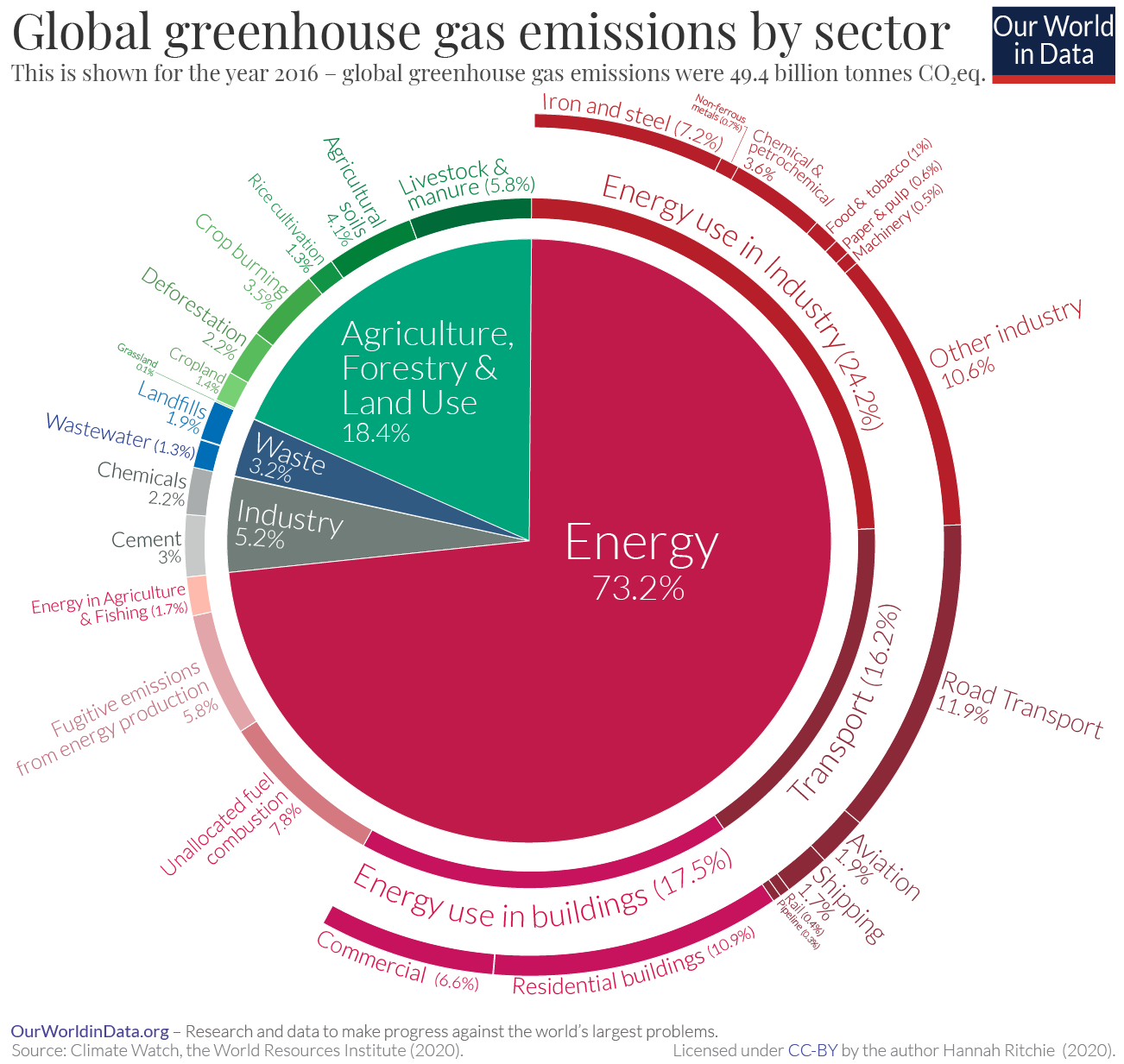
That's a bit of a crowded chart, so let's just look at one country. I'll pick the United Kingdom because it's where I'm currently sat.
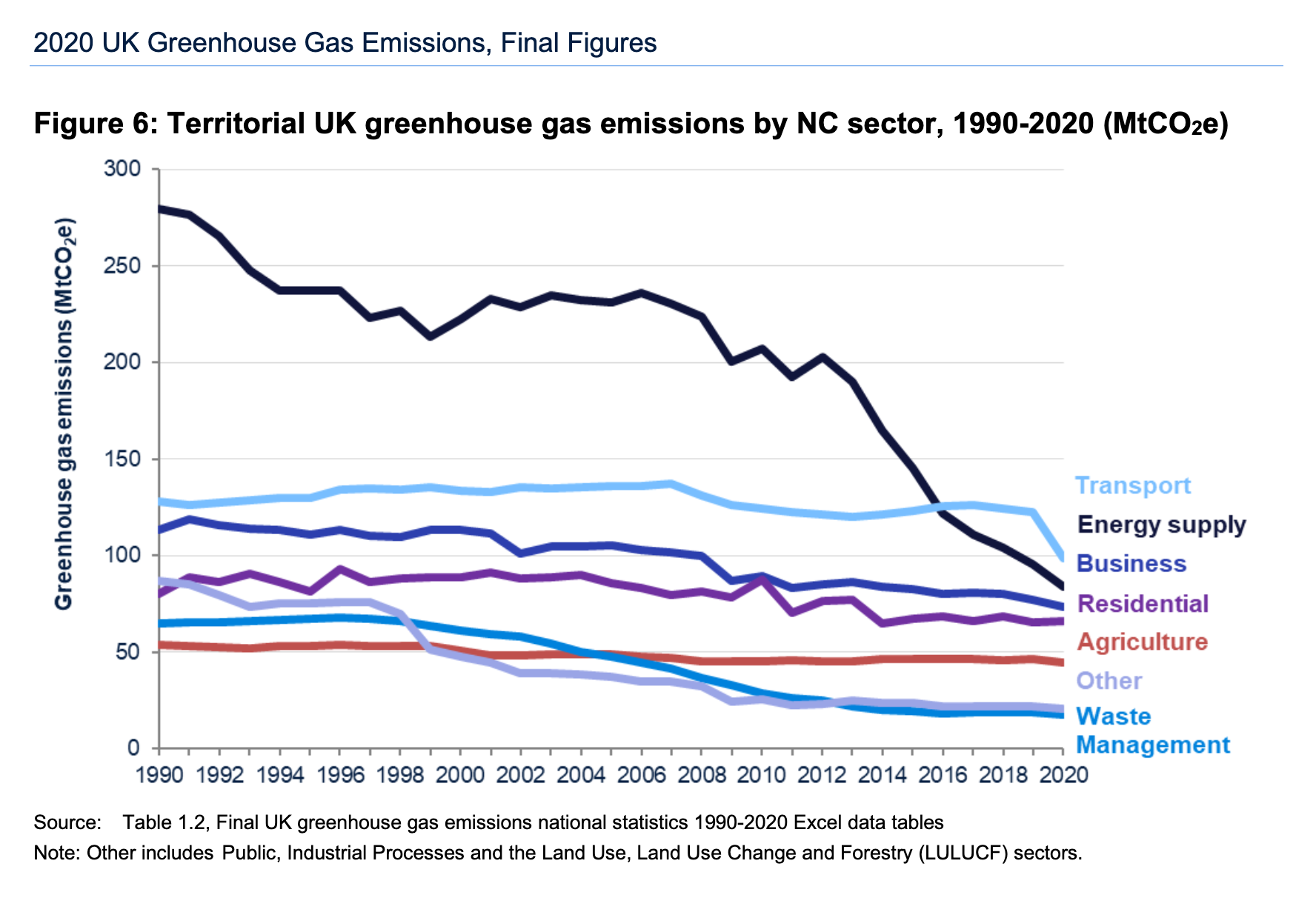
Agriculture makes up 11% of the country's emissions, and as far as land use goes it makes up 76% of the country (and quite a lot of land in other countries).
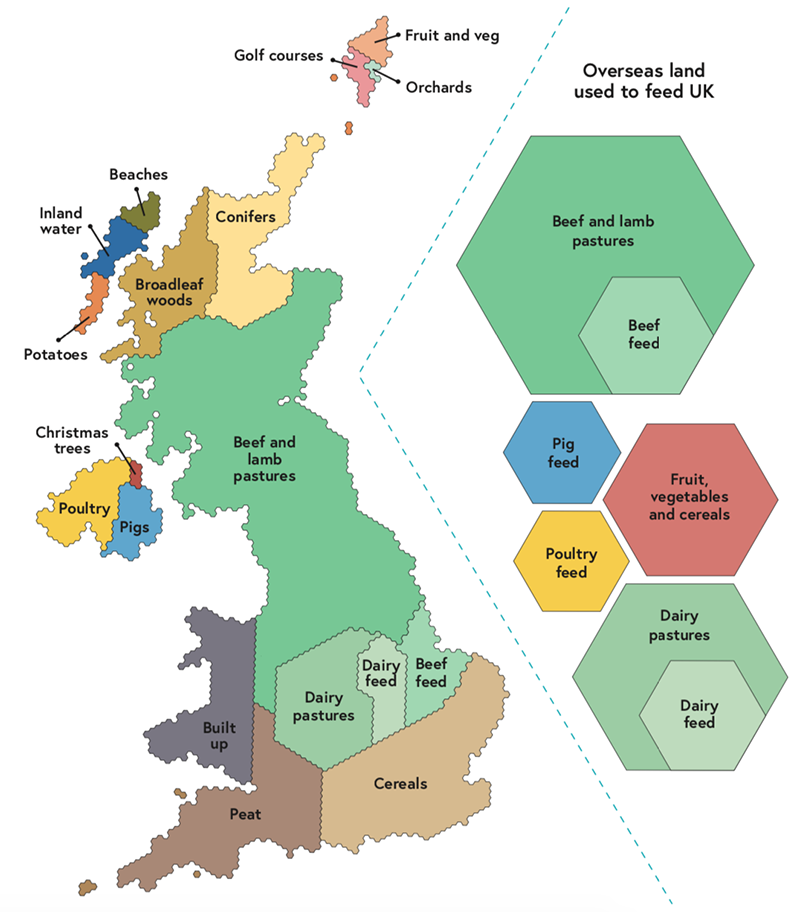
This is where people go off on some anecdotal drivel about how farmers are bastards because of <thing they don't understand>, but we're not going to do that here, because we need to eat food, and agricultural generally has its hands tied by horrendous contractual obligations to supermarkets trying to make food unreasonably cheap, and because all the techniques that can help sequester a bunch of carbon (like direct drilling instead of ploughing, etc.) are too expensive for the average farmer to jump right on due to how hard they're already being squeezed.
We'll talk about farming another time. For now let's talk about what is being produced for us consumers, and try to separate ourselves from ideological differences, to see if we can reduce how much we let our personal preferences guide our choices less when it comes to decided what to put on our plate.
Which diets have the largest footprint
The first chart you'll probably see something like this chart from Shrink that Footprint.
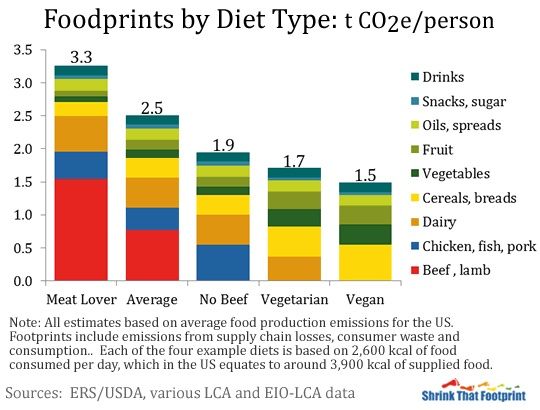
Of course this will vary on where you are, where the food is from, etc. but I think it's amazing to see the huge difference between "eating huge amounts of meat" and continuing to have a normal amount of meat but just not eating beef. The difference is 1.4 tonnes, which is a London <> New York flight, or the average yearly emissions from a car, or more than the entire annual carbon footprint of somebody from Samoa, Paraguay, Congo, Philippines, or Syria.
If you're already a vegan then props to you, that'll be working out all right for your environmental impact. People will argue that the vegan diet is worse for the environment because "soy is one of the largest drivers of deforestation", but that's taking a kernel of truth to make a lie. Soy is a huge driver of deforestation, but 80% of the soybean crop in the world is used for beef, chicken, eggs and dairy, and vegans have nothing to do with that.
Meat heavy diets are clearly the biggest emitters, and the "no beef", vegetarian diet, and veganism is surprisingly close. If you can get from "no beef" to "less meat" and hang out in that wonderful zone of "flexitarianism" where you are slowly cutting out meat without relying on cheese too heavily, then you like me find yourself weaning yourself off a lot of meat.
One really interesting thing about this chart is that veganism isn't the best possible environmental diet. I think the invasivore diet is, but I'll get to that.
Which foods cause the most carbon emissions
Clearly the largest emitting products are those which require lots of (probably deforested) land, and/or feeding food to your food.
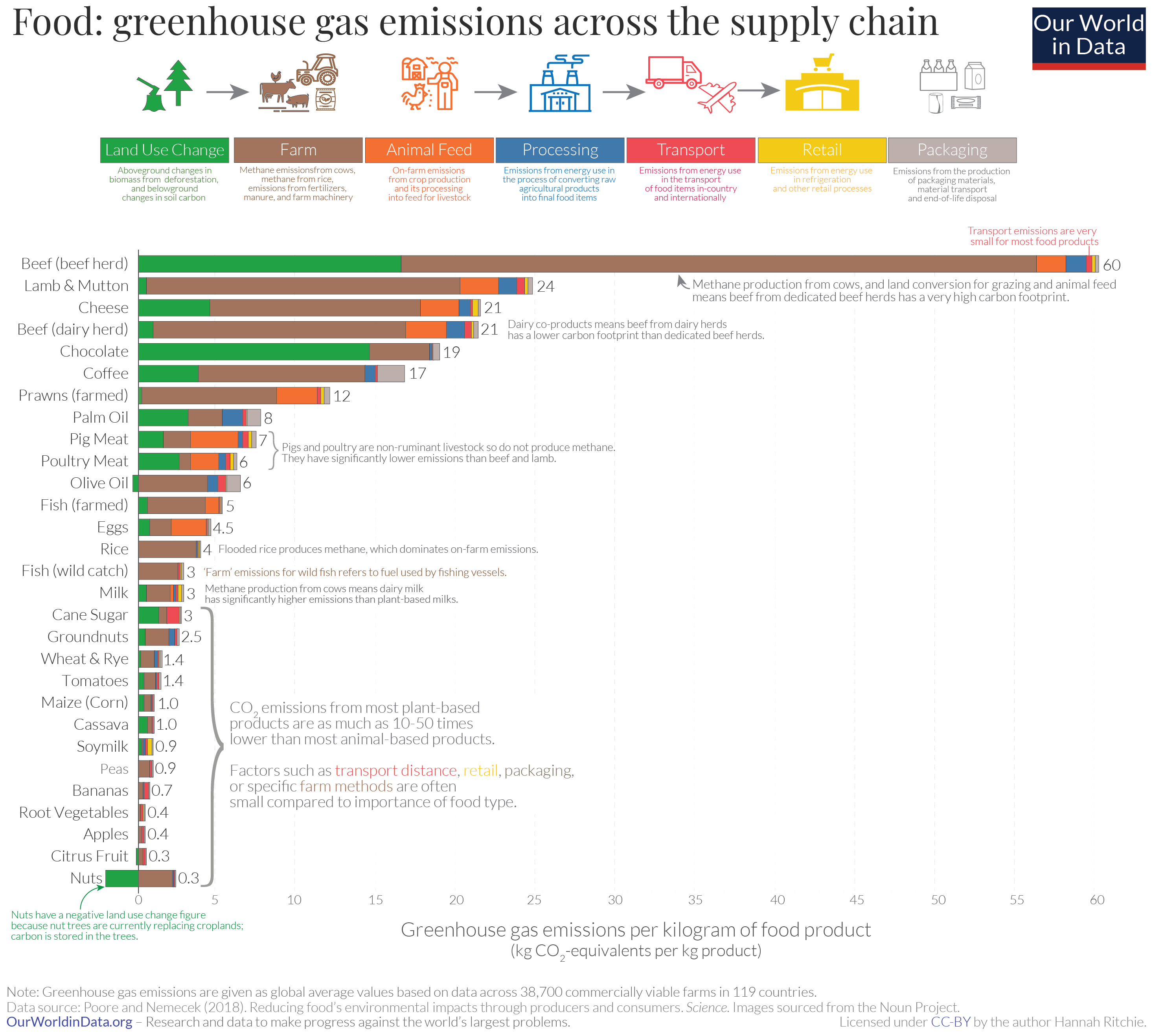
Specifically beef, lamb, cheese, dairy, chocolate, and coffee, are the biggest sources of greenhouse gas emissions of all when it comes to food, which is problematic because they’re massively popular, and getting more-so.
Diets are changing all over the world. Cultures who never used to eat all that much meat are starting to eat more meat, and those who already eat meat are eating more and more meat per serving, meaning the amount of livestock in the world is speeding up rapidly, even outstripping the growth in world population.

For example in Asia meat was for the wealthy, and plant-based diets were common with poor subsistence farmers. Many of those countries are developing, and diets are changing to match "western" diets. The global demand for livestock is creating dystopian scenes like 24 floor pig farms.
Factory farming has reached new heights.
— We Animals Media (@WeAnimals) February 9, 2023
This is pig farming in China. 24 floors dedicated to pig breeding and raising. 1.2 million pigs will come out of this facility each year.
It begs the question, what on earth are we doing?
Credit: Gilles Sabrié for The New York Times pic.twitter.com/ZsAzDZ8RVG
Putting the obvious animal welfare concerns aside, this is a huge problem for emissions as feeding and housing livestock takes a huge amount of energy.
The average cow has a carbon footprint of about 2.3 metric tonnes, which is half the annual carbon footprint of the average person living in Europe. Basically in terms of CO2, every cow on the planet = 1 Brazilian human. Surely it is only reasonable that anyone concerned about human overpopulation on environmental groups should be equally (or more) concerned about an cow overpopulation.
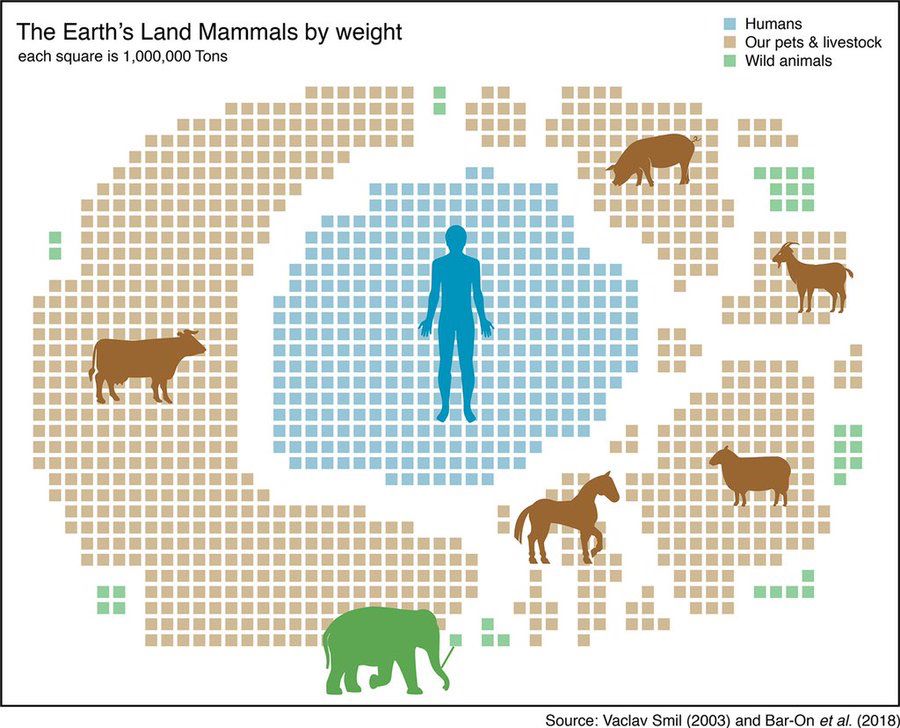
The reliance on meat around the globe has got to the point where it has pushed all other life on this planet into statistical irrelevance. This is the main driving force of the biodiversity crisis: removing habitats for infinite sorts of wildlife that we don't even know the names of, and replacing it with human, cow, pig, horse, sheep, or goat. A functioning global ecosystem necessitates more than just those six things.
Meat isn't even a particularly efficient way of making food.
a report published in Science in 2018 revealed that meat and dairy provide just 18 per cent of calories consumed but use 83 per cent of global farmland and are responsible for 60 per cent of agriculture’s greenhouse gas emissions. – Source: UNFCCC secretariat (UN Climate Change)
Huh. We can do better than that.
What to do about it
Assuming you are a dedicated meat eater and could never go without it, as far as carbon is concerned replacing beef with chicken could have a huge impact.
Switching lamb for shrimp also takes a huge chunk of the emissions off.
Unfortunately there's a little more for us to think about than just swapping things for other things lower down the emissions chart, because it's not just about emissions.
Fishing for Improvements
Fish can be a tempting option based on the CO2 emissions alone, but certain species of fish have been overfished to the point of population collapse, like cod, haddock, salmon, etc.
Greenpeace have a Fish Species "Red List" can help you know what fish to leave alone.
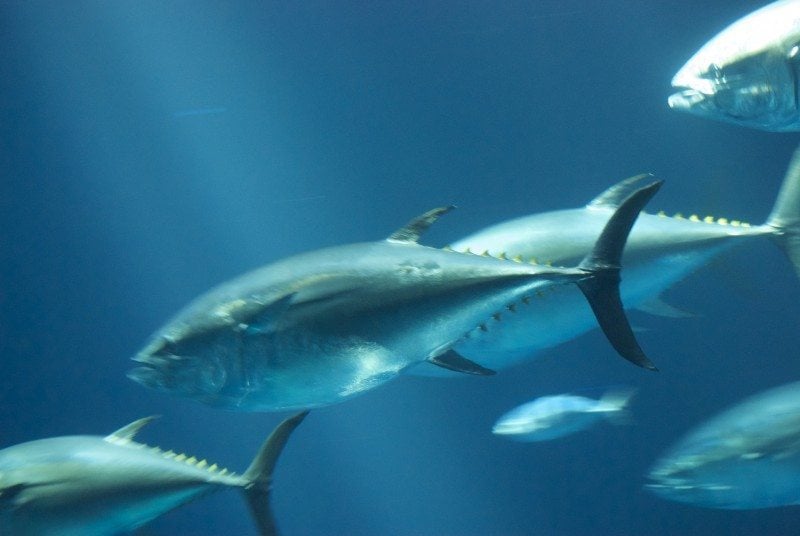
Generally not even farmed fish is solving the problem, due to the carbon emissions of the feed.
All that without even mentioning the utterly insane fishing practice known as "bottom trawling": dragging weighted nets and fucking up the whole sea bed to catch everything in sight, or "super trawling": skip the weights but still grab everything and ditch what dead fish you don't want later.
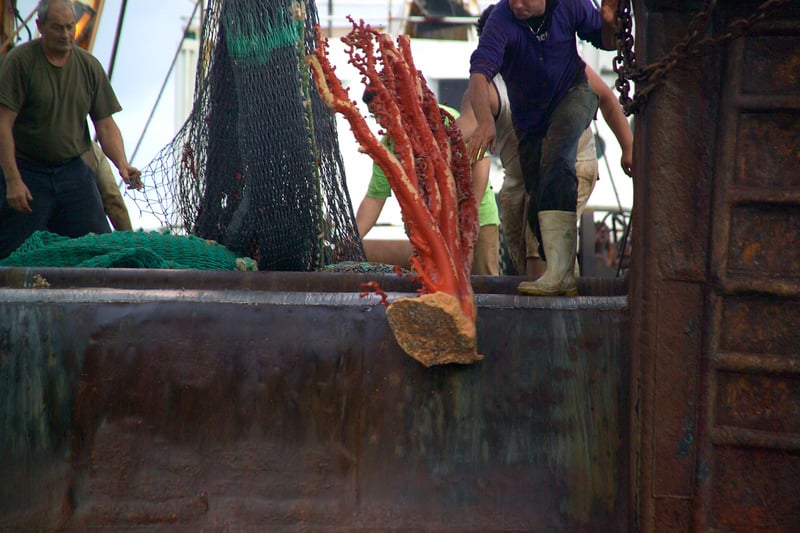
Fishing is a mess, and outside of indigenous communities there is almost no way to eat fish sustainably, unless you caught it yourself in a lake where you know it's stocked properly, or you're managing an invasive outbreak. I've boiled up a few bony bastard fish in a stew from a farm lake, but I generally eat very little fish.
Water Use
As climate change disrupts rain patterns, leads to droughts, aquifers are running dry, and extreme temperatures hammer livestock, that livestock needs more water when there is less available. We cannot increasingly rely on foods which require more water in times when clean water is becoming more and more scarce.
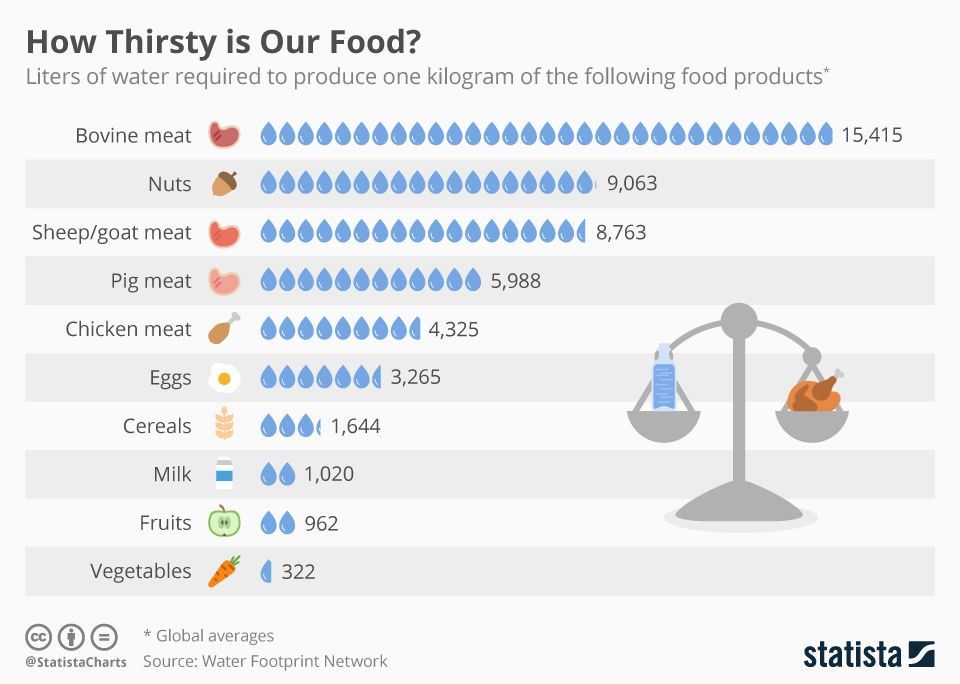
Not only is livestock using up disproportionate amounts of clean water, but they're increasingly polluting our streams and rivers.

However much you enjoy the taste of meat, it's impossible to argue that we can continue to rely on livestock as such a large part of our diet. Reduction or removal are the only logical choice, because the less we require the fewer livestock animals will be bred, and the more than land can be freed up for something else.
I'm planting tens of thousands of trees on several farms where landowners have decided they're not interested in raising livestock anymore. I'd like to increase that number substantially.
Meat Alternatives
A few years back these were not very exciting, but now we can have This isn’t Bacon, Beyond Meat, Impossible Burger, or thousands of other amazing, tasty alternatives which when mixed with a bit of pasta and sauce are barely noticeable as not real meat.
This sort of thing used to be expensive, but these days the "slightly better off" folks have smashed through enough of it that economies of scale kicked in, and now its available in most fast food restaurants and supermarkers for similar prices to animal meat.
Plant-Power Improvements
Everything has a carbon footprint, and people love to complain about the carbon footrint of an avacado with comparing it to anything. Even vegetables being transported halfway around the world have way less impact on the climate than meat coming from around the corner. but why not try and get the double win of getting vegetables from around the corner?
In Europe and North America, “Community Supported Agriculture" (CSA) boxes are a great way to get regular deliveries of awesome, local, often organic fruit and vegetables, from local farmers. This can sound a bit hipster at first, but getting this food delivered to your door means you don’t have to go drive and get it, cuts out supermarkets, it’s usually not all wrapped in a bonkers amount of plastic, and you know it’s not done a lap or two of the world just to get to you. In the UK, Able & Cole, in the USA there’s Local Harvest which helps you find loads of them, but community farm boxes exist all over the world. Crowd Farming can also help you find farmers to buy specific items from directly.
Food Waste
Food waste is a whole topic in itself, but to touch on it briefly here, a huge amount of food is wasted, and ends up in landfill turning into methane. Any food that is diverted from landfill can be considered entirely emission free, because all of the emissions that went into it were going to be wasted and result in increased methane, plus you'd then have to go eat other food which had its own emissions!
Too Good to Go can help you find all sorts of food, vegetarian or meat options generally available.
If you'd like to help reduce vegetable waste you can subscribe to Odd Box who take misshapen items (perfectly fine just look funny), or The Rotten Fruit Box turn fruit that would have otherwise spoiled into tasty treats to enjoy.
The Best Possible Environmental Diet
🥉 Flexitarianism is the goal for getting started with a low carbon footprint.
🥈 Vegetarianism is the next step if you can, to help reduce the footprint of your friends who can't be bothered to reduce their meat consumption at all.
🥇 Veganism is a minor tweak for carbon emissions but is a solid stance for those who focus on animal welfare, and I support you.
The ultimate diet though, in my opinion, is...
🤯 The Invasivore diet!
The U.K., like most countries, is completely overrun with invasive species due to humans making utterly horrendous decisions for years. Those animals need to be removed.
If I was in Hawaii those invasive animals might be live cats, which is not something I could bring myself to kill, or wild boar, which taste fantastic.
I spend a lot of time in the U.K. (where wild board are not invasive), and during lockdown I was taught to hunt, fish, and trap. whilst my bike nomad days were on pause. I learned that our invasive animals are particularly edible.
We ate invasive crawfish, attempting to empty a lake of the disease carrying over-prolific bastards that have been decimating our native crawfish populations. If we ate enough, we would help the natives return. If we didn't eat enough to do that, ahh well, free protein. Basically shrimp.
The farm is having a BBQ today, so everyone spent yesterday driving around (🌏🔥) to a bunch of supermarkets (😷) getting supplies. We have access to a pond full of invasive crawfish so we’re conservation eating our way through them instead! We have SO MANY. pic.twitter.com/r419Un0t5z
— Tree Sturgeon 🚵🔥🌍 (@philsturgeon) April 26, 2020
We ate grey squirrel. Which are forcing our red squirrel populations to extinction. Basically a super greasy chicken wing. The hide made a really weird knife sheath.
We ate pheasant, which aren't invasive but are non-native, and are released in such horrendous numbers that they are mangling food sources for the native population. Basically turkey.
Over 47 million pheasants realeased in the UK each year. Are they robbing UK native species of winter food? Yes! Each day, an adult pheasant needs to eat 103 g of cereal seeds, compared to 8g for tree sparrow, 9g for yellow hammer, and 12g for corn bunting https://t.co/oPtYfYDqi5 pic.twitter.com/vhMJhJvqtR
— Dr Duncan Westbury (@DuncanWestbury) January 4, 2023
We ate muntjack deer. They're from Japan and bark like a dog. They were nackering the saplings we were planting, because like most deer they love to eat trees. Basically beef.
All of this food not only had absolutely zero carbon footprint, but made a positive impact on the biodiversity and greater environment by removing them from it.
This might not be entirely attainable for everyone, so what can you do?
Eat locally sourced venison, because until we reintroduce Lynx and other larger predators in countries like the U.K. that removed them all, deer populations are knackering the landscape, because the pressure they put on their environment is stopping natural regeneration from happening.
Find out what is invasive where you are, and do the responsible thing, and get rid of it.
Reasonable Exceptions
Like all rules there are plenty of exceptions. I was planting trees on a smallholding in Wales where a vegan family has converted a marginal sheep farm to growing their own veg. They rescued some chickens which roam around the farm at will, and if they lay an egg, the vegans will eat it. Why not. They live off food scraps so their carbon footprint is minus. If you have the space, rescue some chickens!
If you cannot entirely give up meat then it's perfectly reasonable to have it on special occasions. I'll have a steak for my birthday, and ignore beef for the rest of the year.
Conservation grazing is a thing. Grazing plays an important role in ecosystem recovery, but there will never be enough of it that we can all keep eating as much meat as we currently do, and I say that as somebody who runs a conservation charity which might be hosting some furry cows on our land to maintain a priority habitat grassland soon. If you're going to grab some meat, see if you can get it from a conservation project, but again you could just buy venison instead and it's pretty good. Costs more, but if you're buying less meat that'll all balance out.
Generally I am perfectly happy not eating massively destructive foods, because my personal preferences for taste are satisfied by alternative meats, sustainably sources local veg, and a cheeky bit of foraging now and then.
What about...?
There are things we can do to tweak the methane burps of cows like feeding them kelp and biochar, which I'm also experimenting with. There's agroforestry and shelterbelts specifically to reduce how much feed the livestock needs due to reduced shivering, which I am doing on 15 farms with more to come.
All of this is tweaking around the edges, and does not avoid the fact we need to have less space and resources dedicated to livestock. What livestock we do have should have more space, better quality of life, and be able to play its role in trampling bracken, maintaining grasslands, etc., which will improve their quality of life and the quality of our landscapes.
Summary
This transition to "less meat" is necessary, as difficult as that may be to hear. To make it a fair transition, we need producers, consumers, and governments, on board, to make sure farmers all over the world are not getting screwed over. There's long and complicated discussions to be had about how we readjust grants and subsidies to be less focused on meat production, and more focused on envioronmental restoration, but that's all another topic for another day.
Follow your heart, but please listen to science, and please try to do what you can to reduce your carbon footprint, because no matter what we think about supporting farmers, no farm is going to survive an unpredictable environment where livestock die en masse and crops fail to drought and unpredictable weather patterns.

If you liked this post please hit Subscribe. I'm sure I missed loads of stuff so feel free to shout at me in the comments. Paid supporters keep articles like this coming so I don't need to paywall anything off. 🥰
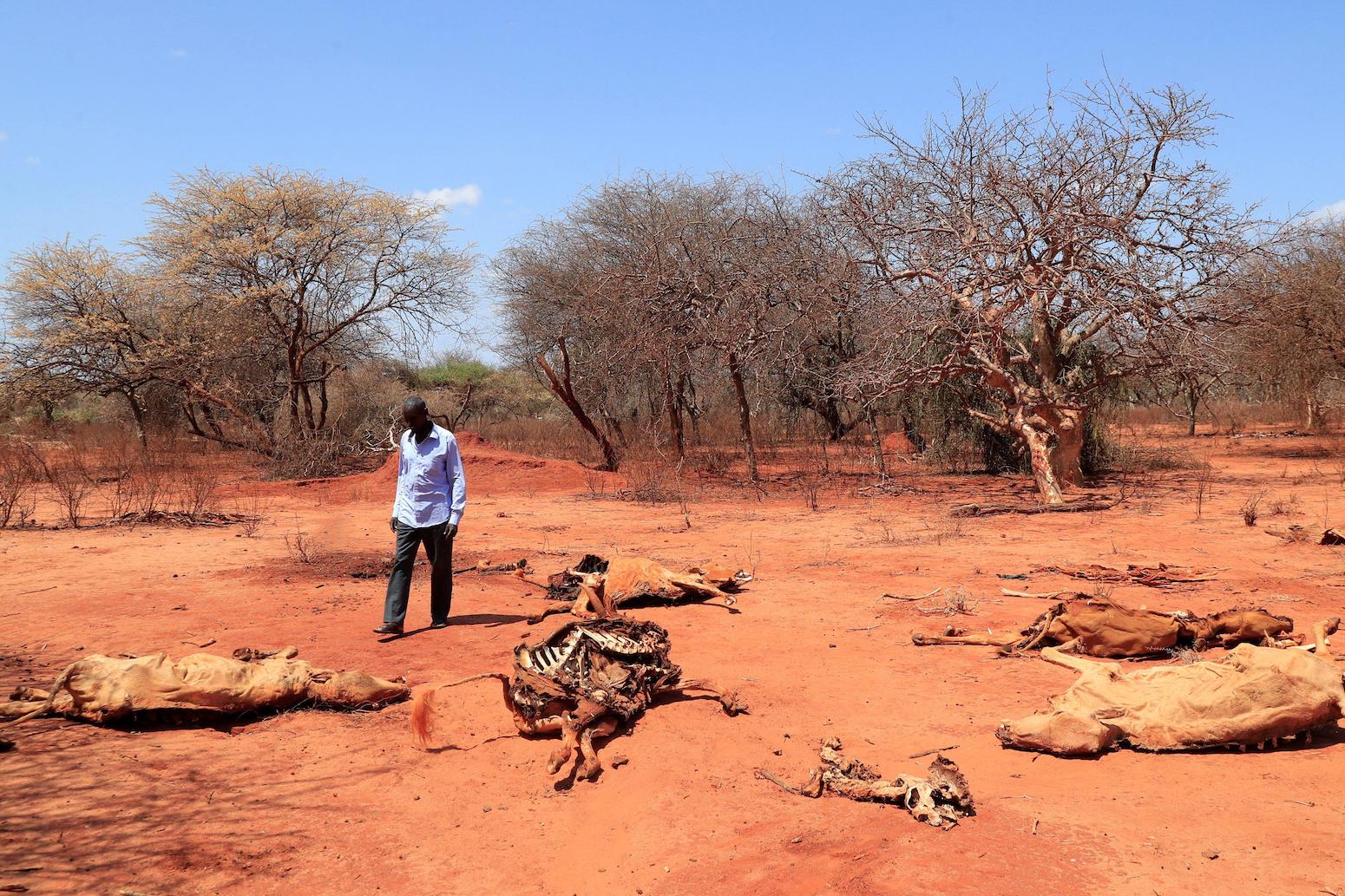



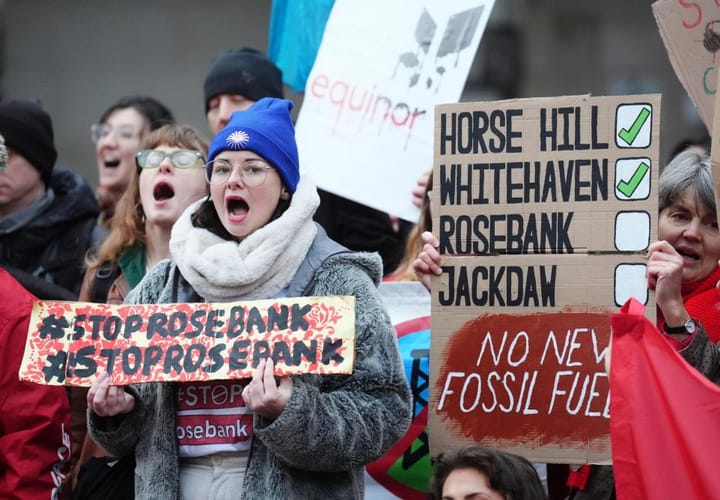
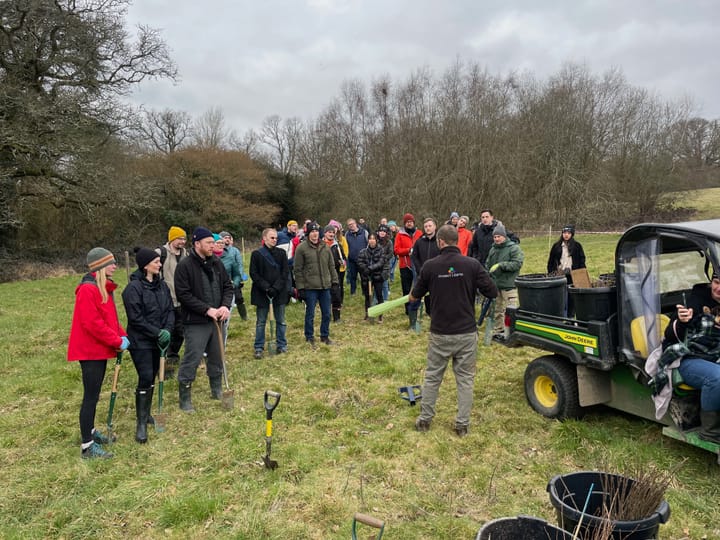
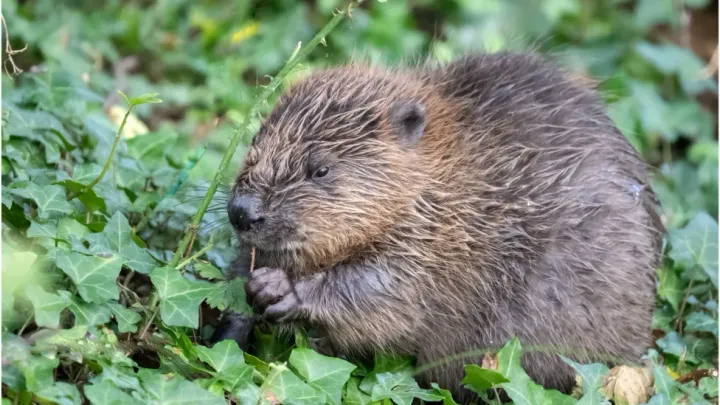
Comments ()